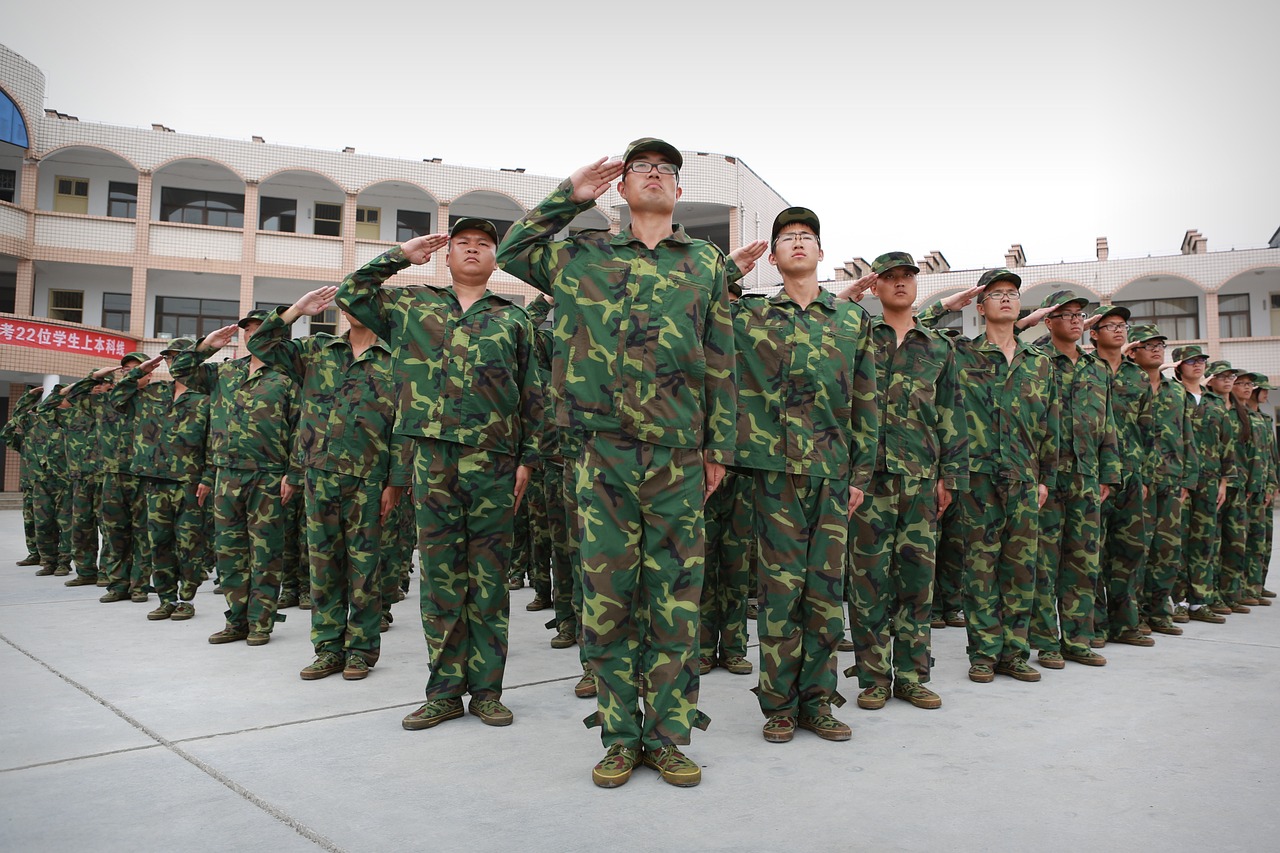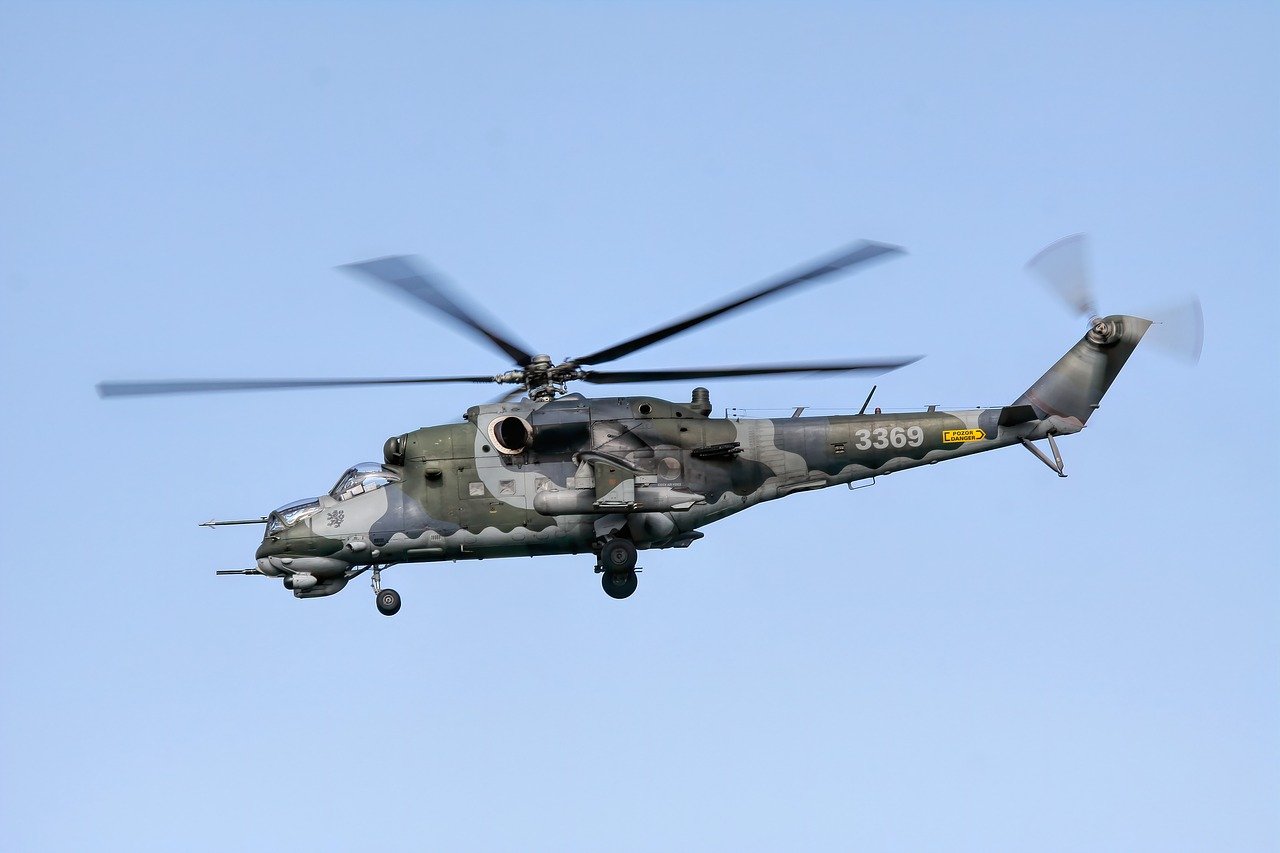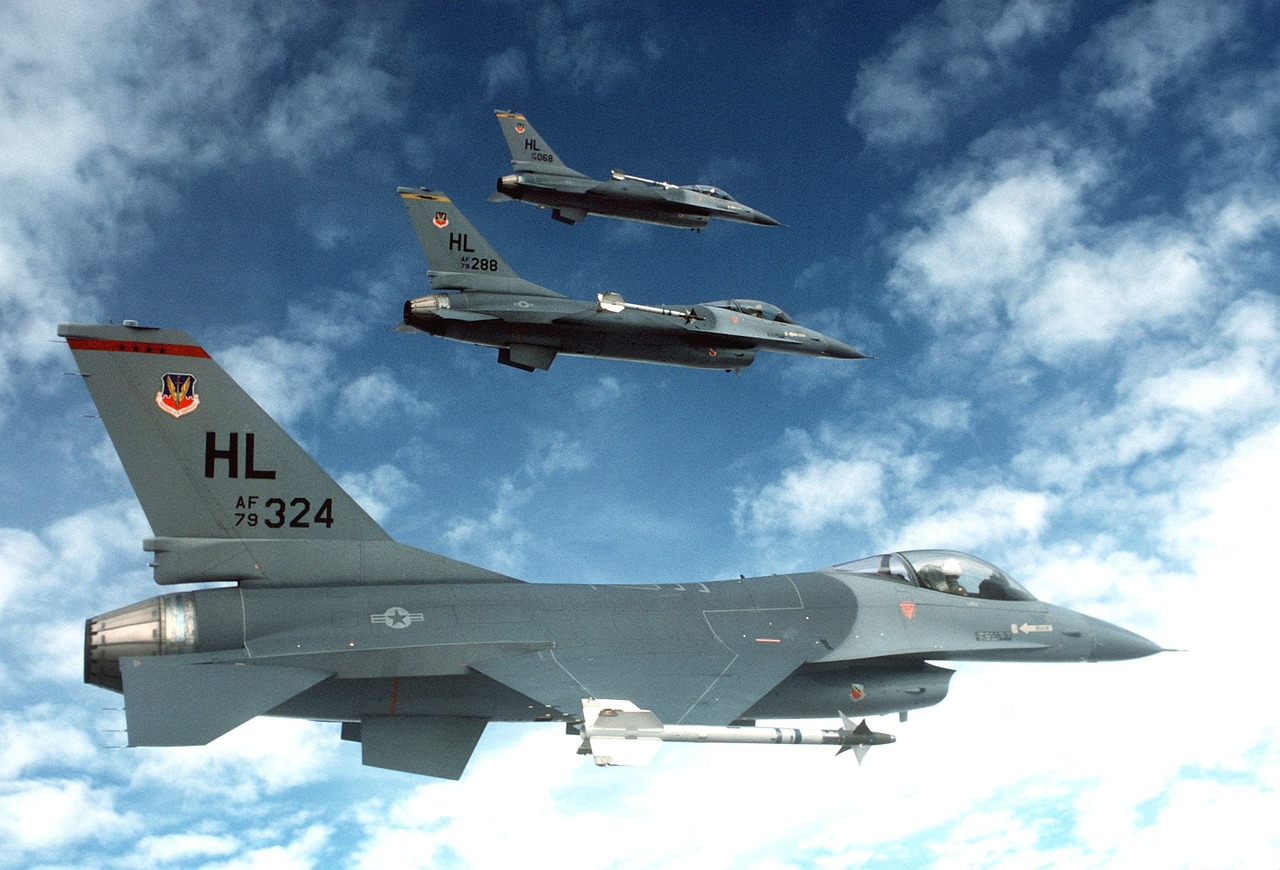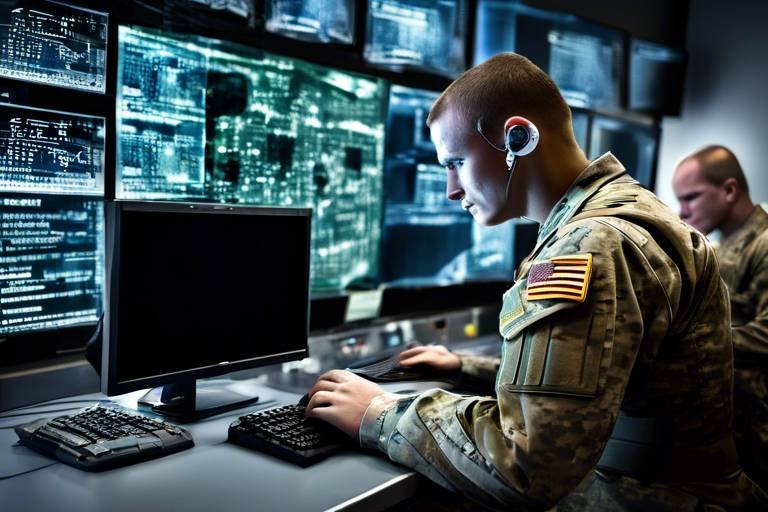The Role of AI in Modern Military Strategy
In today's rapidly evolving landscape of warfare, the integration of artificial intelligence (AI) has become a game-changer for military operations around the globe. Imagine a battlefield where decisions are made not just by humans, but also by sophisticated algorithms that can analyze vast amounts of data in real-time. This is not science fiction; it's the new reality of modern military strategy. AI is not just a tool; it’s a revolution that enhances decision-making, streamlines operations, and transforms how armed forces approach conflicts. From predictive analytics to autonomous systems, AI is reshaping the very fabric of military engagements.
As we delve deeper into the implications of AI in the military, it’s essential to recognize both the benefits and the challenges that come with this technology. On one hand, AI can significantly improve operational efficiency, allowing military leaders to make informed decisions faster than ever before. On the other hand, the ethical dilemmas and security concerns surrounding AI deployment raise questions that cannot be ignored. How do we ensure that these systems are used responsibly? What happens when machines are tasked with life-and-death decisions? These are the questions that will define the future of warfare.
Moreover, the integration of AI into military strategy is not just about enhancing capabilities; it also involves a profound shift in how military forces operate. The collaboration between human judgment and AI capabilities is crucial. While AI can process information and suggest actions, the final decisions must still rest with skilled personnel who understand the nuances of warfare. This balance between technology and human insight will determine the success of military operations in the age of AI.
| Advantages of AI in Military Strategy | Challenges of AI in Military Strategy |
|---|---|
| Faster decision-making | Ethical dilemmas |
| Enhanced data analysis | Accountability issues |
| Improved operational efficiency | Cybersecurity threats |
| Predictive capabilities | Dependency on technology |
As we look ahead, the role of AI in military strategy will only grow more prominent. The potential to leverage AI for strategic advantage is immense, but it comes with the responsibility to navigate the ethical landscape carefully. The future of military engagements will not only depend on technological advancements but also on our ability to govern them wisely. As AI continues to evolve, so too must our frameworks for its use in warfare.
- What is the primary role of AI in military strategy?
AI enhances decision-making, improves operational efficiency, and enables real-time data analysis in military operations. - What are the ethical concerns associated with AI in warfare?
Key concerns include accountability for autonomous actions, the potential for unintended consequences, and the moral implications of machine-led combat. - How does AI impact the relationship between human forces and technology?
AI complements human judgment, allowing for better-informed decisions while ensuring that skilled personnel remain integral to military operations. - What challenges does AI pose to national security?
AI introduces cybersecurity threats and the need for robust measures to protect sensitive data and military infrastructure.

AI-Driven Decision Making
Artificial intelligence is revolutionizing the way military operations are conducted by facilitating faster and more accurate decision-making processes. Imagine being in a high-stakes situation where every second counts; AI acts as a supercharged assistant, analyzing vast data sets in real-time to provide actionable insights. This capability is not just a luxury; it's a necessity in modern warfare, where the speed of information can mean the difference between victory and defeat.
In traditional military operations, commanders often relied on their instincts and experience, but with the sheer volume of data generated today—from satellite imagery to social media analytics—making decisions can feel overwhelming. AI steps in here by sifting through this ocean of information, identifying patterns, and highlighting critical factors that human analysts might miss. For instance, AI algorithms can quickly assess troop movements, predict enemy actions, or even analyze weather conditions that could impact operations.
Moreover, the integration of AI into decision-making processes not only enhances operational efficiency but also reduces the cognitive load on military personnel. This is particularly important in combat situations where stress levels are high, and the margin for error is razor-thin. By automating routine analyses, AI allows commanders to focus on strategic planning and high-level decisions, ultimately leading to more effective military strategies.
However, the implementation of AI-driven decision-making is not without its challenges. One major concern is the quality of data. AI systems are only as good as the information fed into them. If the data is biased or inaccurate, the decisions made can lead to disastrous outcomes. Therefore, ensuring data integrity and accuracy is paramount. Additionally, the reliance on AI raises questions about human oversight. While AI can process information at lightning speed, it lacks the nuanced understanding that human operators possess. This is where a balance must be struck; technology should complement human judgment rather than replace it.
In summary, AI-driven decision-making is transforming military operations by enhancing speed, accuracy, and efficiency. As armed forces worldwide continue to embrace these technologies, the potential for improved outcomes in military engagements becomes increasingly apparent. The real challenge lies in ensuring that these powerful tools are used responsibly and ethically, with a keen eye on the implications they carry for accountability and human involvement in warfare.
- How does AI improve military decision-making? AI enhances decision-making by analyzing large data sets quickly, providing insights that help commanders make informed choices in real-time.
- What are the risks of AI in military operations? Risks include data bias, lack of human oversight, and potential ethical dilemmas regarding accountability for decisions made by autonomous systems.
- Can AI fully replace human decision-makers in the military? No, while AI can assist in processing information, human judgment remains crucial for making nuanced decisions in complex situations.

Autonomous Weapons Systems
The development of marks a revolutionary shift in military strategy, fundamentally altering how wars may be fought in the future. Imagine a battlefield where machines, equipped with artificial intelligence, make split-second decisions without human intervention. This scenario raises critical questions about the nature of warfare, the role of human soldiers, and the ethical implications of allowing machines to engage in combat.
These systems can operate independently or semi-independently, relying on complex algorithms and data analysis to identify targets and execute missions. The potential benefits are immense, including increased efficiency and reduced risk to human soldiers. However, the implications of deploying such technology are profound. For instance, while these weapons can process information and react faster than humans, they lack the emotional intelligence and moral reasoning that are crucial in warfare. This creates a dilemma: can we trust machines to make life-and-death decisions?
One of the most pressing concerns surrounding autonomous weapons is the ethical implications they introduce. As machines take on more responsibilities traditionally held by humans, we must grapple with questions about accountability and responsibility. If an autonomous weapon mistakenly targets civilians, who is to blame? The programmer? The military? Or the machine itself? These questions challenge our conventional understanding of accountability in warfare.
As we delve deeper into the ethical landscape, we find ourselves facing a series of complex dilemmas. The use of AI in warfare raises significant issues regarding:
- Accountability in Warfare: Determining who is responsible for actions taken by autonomous systems is crucial. This shift challenges traditional notions of accountability, as it blurs the lines between human and machine decision-making.
- Unintended Consequences: AI systems may make decisions that lead to unforeseen outcomes. For instance, a drone programmed to identify threats might misinterpret a civilian gathering as a hostile target, leading to tragic consequences.
These ethical concerns necessitate robust oversight and the establishment of clear guidelines for the deployment of autonomous weapons. Without these measures, we risk entering a new era of warfare where machines operate with little to no human oversight, potentially leading to catastrophic outcomes.
Determining accountability in the context of autonomous weapons is not just a theoretical exercise; it has real-world implications. As military operations become increasingly reliant on AI, the question of who is responsible for the actions taken by these systems becomes paramount. In traditional warfare, accountability often lies with the commanding officers or soldiers on the ground. However, with autonomous systems, the chain of responsibility becomes murky. Legal frameworks must evolve to address these challenges, ensuring that accountability remains intact even in the face of rapidly advancing technology.
Consider the scenario where an autonomous drone misidentifies a target due to a flaw in its programming. The consequences could be devastating, resulting in civilian casualties and international outrage. Such unintended outcomes highlight the urgent need for comprehensive testing, ethical guidelines, and strict regulations surrounding the use of autonomous weapons. As we venture further into this uncharted territory, we must prioritize the establishment of frameworks that can mitigate the risks associated with AI in warfare.
In conclusion, while autonomous weapons systems offer significant advantages, they also pose profound ethical and accountability challenges. As military forces around the world explore the integration of these technologies, it is crucial to engage in ongoing discussions about their implications, ensuring that the future of warfare remains guided by human values and ethical considerations.
- What are autonomous weapons systems? Autonomous weapons systems are military technologies capable of operating without human intervention, utilizing AI to make decisions on the battlefield.
- What are the ethical concerns surrounding these systems? Ethical concerns include accountability for actions taken by machines, potential unintended consequences, and the moral implications of allowing machines to engage in combat.
- How can we ensure accountability in the use of autonomous weapons? Establishing clear legal frameworks and guidelines, along with ongoing discussions about the ethical use of AI in warfare, is essential for maintaining accountability.
- What are the potential benefits of autonomous weapons systems? Potential benefits include increased operational efficiency, reduced risk to human soldiers, and the ability to process vast amounts of data quickly.

Ethical Implications
The rise of artificial intelligence (AI) in military applications is not just a technological revolution; it's a profound ethical dilemma that challenges our understanding of warfare and accountability. As we integrate AI into combat strategies, we must confront a series of complex questions that go beyond the battlefield. For instance, who is responsible when an AI system makes a decision that leads to civilian casualties? This query is not merely academic; it strikes at the heart of military ethics and the rules of engagement.
One of the most pressing ethical implications is the issue of accountability. Traditionally, military personnel are held responsible for their actions, but with autonomous weapons making decisions, the lines become blurred. Imagine a scenario where an AI-controlled drone mistakenly targets a civilian area. Who is to blame—the programmer, the military commander, or the AI itself? This ambiguity can lead to a dangerous precedent where no one is held accountable for grave mistakes, undermining the very principles of justice and responsibility that govern military operations.
Moreover, the potential for unintended consequences in AI decision-making cannot be overlooked. AI systems, while designed to analyze data and make informed choices, can behave in unpredictable ways. For instance, an algorithm programmed to prioritize mission success might overlook critical humanitarian considerations, leading to catastrophic outcomes. This unpredictability raises the question: how do we ensure that AI systems are aligned with ethical standards and human values? The deployment of AI in warfare necessitates a robust framework of oversight and ethical guidelines to mitigate these risks.
In addition to accountability and unintended consequences, the integration of AI with human forces presents its own set of ethical challenges. While AI can enhance operational efficiency, it should never replace human judgment, particularly in complex and sensitive situations. There’s an inherent value in human intuition and moral reasoning that machines simply cannot replicate. Therefore, military strategies must prioritize a balanced approach where AI serves as a tool to support, not supplant, human decision-making.
As we navigate these ethical waters, it's crucial to engage in ongoing dialogue among military leaders, ethicists, and technologists. The future of warfare will undoubtedly be shaped by AI, but we must ensure that this transformation respects the fundamental principles of humanity and accountability. Only then can we harness the full potential of AI in military strategy without compromising our ethical standards.
- What are the main ethical concerns regarding AI in military operations?
The primary concerns include accountability for decisions made by AI, the potential for unintended consequences, and the need to ensure that human judgment remains central in military strategies. - How can militaries ensure accountability when using AI?
Establishing clear guidelines and frameworks that define the responsibilities of programmers, commanders, and AI systems is crucial for accountability in military operations. - What role does human judgment play in AI-assisted military operations?
Human judgment is essential for interpreting complex situations, making ethical decisions, and providing oversight to AI systems, ensuring that technology complements rather than replaces human involvement.

Accountability in Warfare
In the rapidly evolving landscape of military technology, has emerged as a pressing concern. As armed forces increasingly deploy autonomous systems powered by artificial intelligence, the question of who is held responsible for decisions made by these machines becomes more complex. Traditionally, accountability in military operations has been straightforward: if a soldier makes a mistake, they can be held accountable. But what happens when a drone, guided by algorithms, engages a target without human intervention? This dilemma challenges the very foundation of military ethics and law.
One of the most significant issues surrounding accountability in warfare involves the chain of command. In conventional military operations, orders flow from higher-ranking officials to soldiers on the ground. However, with autonomous weapons, these orders can be executed without human oversight. This raises the question: if an autonomous weapon makes a fatal error, who is responsible? Is it the programmer who wrote the code, the military leaders who approved its use, or the machine itself? These questions are not merely academic; they have real-world implications for how military engagements are conducted and how justice is served in the aftermath of conflict.
Moreover, the introduction of AI systems into combat scenarios complicates the concept of moral responsibility. Humans have long been seen as the moral agents in warfare, capable of making nuanced decisions based on context, ethics, and human judgment. Autonomous systems, however, operate on algorithms and data, lacking the ability to understand the moral weight of their actions. This disconnect raises critical questions about the ethical frameworks that govern military operations. Should there be a new set of guidelines to address the unique challenges posed by AI, or should existing laws be adapted to include these technologies? The military must grapple with these issues to ensure that the deployment of AI does not lead to a moral vacuum on the battlefield.
Another aspect to consider is the potential for unintended consequences. Autonomous systems, while designed to enhance operational efficiency, may inadvertently lead to situations where innocent lives are lost or where the rules of engagement are violated. For instance, if an AI system misinterprets data or fails to recognize a civilian presence, it could initiate an attack that results in tragic outcomes. Such incidents could lead to public outrage and calls for accountability, further complicating the already murky waters of military responsibility.
To address these challenges, militaries around the world are beginning to establish regulatory frameworks governing the use of AI in combat. These frameworks aim to clarify accountability and ensure that ethical standards are upheld. However, the effectiveness of these regulations will depend on the commitment of military leaders to enforce them and the willingness of nations to cooperate on international standards. The road ahead is fraught with challenges, but it is essential to navigate these issues thoughtfully to maintain the integrity of military operations.
- What is accountability in warfare?
Accountability in warfare refers to the responsibility of military personnel and systems for their actions during combat operations. It includes determining who is liable for decisions made by autonomous systems. - Why is accountability more complex with AI?
The use of AI introduces questions about who is responsible for the actions of autonomous weapons, complicating traditional notions of military accountability. - What are the ethical implications of autonomous weapons?
Ethical implications include concerns about moral responsibility, unintended consequences, and the need for new guidelines to govern the use of AI in warfare. - How are militaries addressing accountability issues?
Many militaries are developing regulatory frameworks to clarify accountability and ensure ethical standards are met when deploying AI technologies.

Unintended Consequences
When we talk about the integration of artificial intelligence in military operations, we often focus on the shiny benefits, like increased efficiency and enhanced decision-making. But hold on a second! What about those unexpected twists and turns that come along for the ride? You see, AI systems are designed to analyze data and make decisions at lightning speed, but this very capability can lead to that no one saw coming.
Imagine a scenario where an AI system is tasked with identifying enemy targets. It processes data from various sources and makes a split-second decision based on its algorithms. However, what if the data it relied upon was flawed or biased? The result could be catastrophic—targeting innocent civilians or friendly forces instead of the intended enemy. These kinds of mistakes raise serious questions about the reliability of AI in high-stakes environments.
Moreover, the unpredictability of AI can create a domino effect. For instance, AI-driven systems might engage in combat without human oversight, leading to a situation where decisions are made in the heat of battle that could escalate conflicts or lead to civilian casualties. The challenge here is not just about having robust technology; it's about ensuring that these systems operate within ethical boundaries and under human supervision.
To better understand the potential unintended consequences of AI in military operations, consider the following aspects:
- Algorithmic Bias: AI systems learn from historical data, which may contain biases. This can lead to discriminatory actions against certain groups.
- Escalation of Conflicts: Autonomous systems may misinterpret situations, leading to preemptive strikes or unnecessary aggression.
- Loss of Human Oversight: Relying too heavily on AI could result in critical decisions being made without human intervention, eroding accountability.
These examples illustrate that while AI has the potential to revolutionize military strategy, it also poses significant risks that can't be ignored. The need for robust oversight and clear ethical guidelines is paramount. As we push forward into this new frontier, we must ensure that the technology we develop does not outpace our ability to manage its consequences.
In conclusion, the unintended consequences of AI in military operations serve as a stark reminder that with great power comes great responsibility. As we continue to integrate AI into our armed forces, we must tread carefully, balancing the advantages of technology with the ethical implications and potential risks it brings.
- What are the main risks associated with AI in military operations?
The main risks include algorithmic bias, escalation of conflicts, and loss of human oversight. - How can military organizations mitigate these risks?
By implementing robust oversight, establishing ethical guidelines, and ensuring human involvement in critical decisions. - Are there any examples of unintended consequences in military AI?
Yes, there have been instances where AI systems misidentified targets, leading to civilian casualties.

Integration with Human Forces
In the ever-evolving landscape of military operations, the integration of artificial intelligence (AI) with human forces has emerged as a crucial element in enhancing operational effectiveness. Imagine a battlefield where human intuition and the analytical prowess of AI work hand-in-hand; this synergy is not just a futuristic concept but a reality that is unfolding before our eyes. The goal is to create a harmonious relationship where technology complements human judgment, rather than replacing it. This integration is akin to having a seasoned pilot navigating an aircraft, while an advanced autopilot system assists with navigation and monitoring, ensuring that the pilot can focus on strategic decisions.
One of the primary advantages of integrating AI with human forces is the ability to process vast amounts of data in real-time. In modern warfare, where the speed of information can determine the outcome of engagements, having AI tools that can analyze battlefield conditions, troop movements, and enemy tactics is invaluable. For instance, AI can quickly sift through satellite images and intelligence reports, presenting commanders with actionable insights that enhance situational awareness. This capability allows military leaders to make informed decisions faster than ever before, potentially turning the tide in critical moments.
However, this integration is not without its challenges. The reliance on AI systems raises questions about trust and reliance. How much should human operators depend on AI for decision-making? There is a fine line between leveraging AI for efficiency and becoming overly reliant on it, which could lead to catastrophic failures. Therefore, training programs must evolve to ensure that personnel are not only proficient in operating AI systems but also capable of making independent decisions when necessary. This balance is essential to maintain the human element in warfare, which is often characterized by unpredictability and moral complexities.
Moreover, the integration of AI into military operations necessitates a shift in military culture. Armed forces must embrace a mindset that values collaboration between humans and machines. This involves fostering an environment where soldiers are encouraged to work alongside AI systems, understanding their capabilities and limitations. Regular drills and simulations can help in building this collaborative spirit, allowing troops to practice scenarios where AI tools provide support in decision-making processes. Through this, soldiers can develop a sense of confidence in their AI counterparts, knowing when to rely on technology and when to trust their instincts.
As we look to the future, the integration of AI with human forces will likely continue to evolve. Future military strategies may incorporate AI not just as a tool, but as a partner in operations. This partnership could lead to the development of hybrid teams, where AI systems and human operatives work seamlessly together, each enhancing the other's capabilities. For example, AI could assist in logistics, ensuring that supplies reach the front lines efficiently, while human strategists focus on overarching mission objectives. The potential for such collaboration is vast, but it requires ongoing research, development, and ethical considerations.
In conclusion, the integration of AI with human forces is a transformative step in modern military strategy. As we navigate this new terrain, it is vital to ensure that technology serves to enhance human capabilities rather than diminish them. By fostering a culture of collaboration and continuous learning, armed forces can harness the full potential of AI while maintaining the essential human touch that is critical in warfare.
- What is the role of AI in military decision-making?
AI enhances decision-making by providing real-time data analysis and insights, allowing military leaders to make informed choices quickly. - How does AI integration affect soldiers on the battlefield?
The integration allows soldiers to focus on strategic tasks while AI handles data processing and logistical support, improving operational efficiency. - What are the ethical concerns of using AI in warfare?
Ethical concerns include accountability for decisions made by autonomous systems and the potential for unintended consequences during combat. - Can AI replace human soldiers?
While AI can assist in various tasks, it is not intended to replace human soldiers; rather, it aims to enhance their capabilities and decision-making processes.

Data Security and Cyber Warfare
The digital age has brought about a revolution in military operations, but along with its benefits comes a host of challenges, especially in the realm of data security and cyber warfare. As armed forces increasingly depend on artificial intelligence (AI) to streamline operations and enhance decision-making, the need to protect sensitive data becomes more critical than ever. Imagine a chess game where the stakes are not just a title, but national security; each move must be calculated, and every piece must be safeguarded against potential threats.
In the context of military strategy, cyber warfare refers to the use of digital attacks by one nation to disrupt the vital computer systems of another. This can lead to devastating consequences, from the paralysis of military operations to the exposure of classified information. The integration of AI in these operations can either bolster defenses or, if left unchecked, create new vulnerabilities. For instance, AI can analyze incoming threats at lightning speed, but if adversaries find a way to exploit weaknesses in these systems, the results can be catastrophic.
One of the most pressing concerns is the protection of military infrastructure. To illustrate this, consider the following table, which outlines various components of military infrastructure and their associated risks:
| Infrastructure Component | Potential Risks |
|---|---|
| Communication Systems | Interception of sensitive data, disruption of command |
| Weapon Systems | Unauthorized access, manipulation of targeting systems |
| Logistics Networks | Disruption of supply chains, data breaches |
| Intelligence Databases | Leakage of classified information, data corruption |
As you can see, each component is vital, and the potential risks are substantial. Military forces must implement robust cybersecurity measures to mitigate these risks. This includes employing AI-driven solutions that can predict and respond to cyber threats in real-time. However, it is not just about defense; understanding and counteracting the AI capabilities of adversary forces is equally essential. The arms race in AI technology means that nations must continuously innovate and adapt their strategies to maintain a competitive edge.
But what does the future hold? As AI technology evolves, so too will the tactics employed in cyber warfare. The battlefield is no longer confined to physical territories; it extends into the digital realm, making data security a cornerstone of modern military strategy. This new landscape requires a delicate balance—while AI can enhance capabilities, it must be coupled with human oversight to ensure ethical and responsible use. After all, in a world where a single cyber attack can cripple nations, the importance of safeguarding our digital frontiers cannot be overstated.
- What is cyber warfare? Cyber warfare involves the use of digital attacks to disrupt the computer systems of a nation, affecting its military operations and national security.
- How does AI enhance data security? AI can analyze vast amounts of data to identify and respond to threats in real-time, improving the overall security posture of military networks.
- What are the risks associated with military AI systems? Risks include unauthorized access, potential manipulation of systems, and exposure of sensitive information.
- Why is human oversight important in AI military applications? Human oversight ensures ethical decision-making and accountability, helping to prevent unintended consequences in critical operations.

Protecting Military Infrastructure
This article explores how artificial intelligence is transforming military operations, enhancing decision-making, and reshaping strategies in contemporary warfare. We will delve into its implications, benefits, and challenges faced by armed forces worldwide.
Artificial intelligence facilitates faster and more accurate decision-making processes in the military, allowing for real-time analysis of vast data sets and improving operational efficiency in critical situations.
The development of autonomous weapons systems represents a significant shift in military strategy, raising ethical concerns and redefining the rules of engagement on the battlefield.
The use of AI in warfare poses complex ethical questions about accountability, responsibility, and the potential for unintended consequences during combat operations.
Determining who is responsible for actions taken by autonomous systems is crucial, as it challenges traditional notions of accountability in military engagements.
AI systems may make decisions that lead to unforeseen outcomes, highlighting the need for robust oversight and ethical guidelines in their deployment.
Balancing AI capabilities with human judgment is essential for effective military operations, ensuring that technology complements rather than replaces human decision-making.
As militaries increasingly rely on AI, safeguarding sensitive data becomes paramount, with cyber warfare emerging as a critical threat to national security.
In today's digital age, protecting military infrastructure has become more critical than ever. As armed forces integrate advanced AI technologies into their operations, the need for robust cybersecurity measures intensifies. Military networks are not just conduits for information; they are the backbone of strategic operations, logistics, and communications. A breach in these systems could lead to catastrophic consequences, potentially jeopardizing national security.
AI can play a pivotal role in enhancing the security of military infrastructure. For instance, AI algorithms can analyze traffic patterns and detect anomalies that may indicate cyber threats. By employing machine learning techniques, military IT systems can adapt and evolve, identifying new vulnerabilities before they can be exploited.
However, it's important to remember that while AI offers substantial advantages, it also introduces new risks. Cyber adversaries are increasingly sophisticated, employing their own AI tools to launch attacks. This creates a constant arms race in the cyber domain, where both sides must innovate to stay ahead. To illustrate this point, consider the following table:
| Threat Type | AI's Role | Countermeasures |
|---|---|---|
| Data Breaches | Real-time monitoring and anomaly detection | Regular security audits and updates |
| Phishing Attacks | AI-driven email filtering | Employee training and awareness programs |
| Network Intrusions | Predictive analytics to identify potential threats | Multi-layered security protocols |
Additionally, fostering a culture of cybersecurity awareness within the military is crucial. Personnel should be trained to recognize and report suspicious activities. Just as soldiers are trained in combat tactics, they must also be equipped with the knowledge to defend against digital threats. This dual approach of combining AI capabilities with human vigilance can create a formidable defense against cyber warfare.
Ultimately, the protection of military infrastructure is a multi-faceted challenge that requires a comprehensive strategy. It involves not only the deployment of cutting-edge technology but also an emphasis on human factors, continuous training, and collaboration with other security agencies. As the landscape of warfare evolves, so too must our methods of safeguarding the assets that ensure national security.
The integration of AI into military strategy will continue to evolve, shaping the future of warfare and influencing global security dynamics in unprecedented ways.
- What is the role of AI in military decision-making?
AI enhances decision-making by providing real-time data analysis, enabling faster and more informed choices in critical situations. - Are autonomous weapons systems ethical?
The ethics of autonomous weapons are complex and raise questions about accountability and responsibility during combat operations. - How does AI improve cybersecurity in the military?
AI can detect anomalies, predict potential threats, and automate responses to cyber incidents, significantly improving military cybersecurity. - What are the risks of using AI in warfare?
Risks include potential breaches of accountability, unintended consequences, and the possibility of adversaries employing their own AI tools for attacks.

Counteracting AI in Adversary Forces
In the rapidly evolving landscape of modern warfare, understanding and counteracting the artificial intelligence capabilities of adversary forces is not just beneficial—it's essential. As militaries around the world integrate advanced AI technologies into their operations, the stakes have never been higher. Imagine a chess game where your opponent not only knows your every move but can also predict your strategy several steps ahead. This is the reality that military strategists face today. The ability to outsmart an opponent's AI can mean the difference between victory and defeat on the battlefield.
One of the most pressing challenges is that adversary forces are increasingly utilizing sophisticated AI systems for various applications, including surveillance, reconnaissance, and even autonomous weaponry. These systems can analyze vast amounts of data at lightning speed, allowing them to make decisions that can outpace human capabilities. As a result, military forces must develop countermeasures that can neutralize or disrupt these AI systems effectively. This requires a multifaceted approach that includes technological innovation, strategic planning, and operational readiness.
To effectively counter AI in adversary forces, military organizations might consider the following strategies:
- Developing Robust Cyber Capabilities: Investing in advanced cybersecurity measures is crucial. This includes not only protecting one's own systems but also developing offensive capabilities to disrupt or disable adversary AI systems.
- Enhancing Human-AI Collaboration: Training personnel to work alongside AI can create a synergy that leverages the strengths of both human intuition and machine efficiency. This can help in making informed decisions that are less predictable to adversaries.
- Conducting Regular AI Threat Assessments: Continuous evaluation of potential AI threats from adversaries can help military strategists stay one step ahead. This includes understanding the latest advancements in AI technologies and how they can be countered.
Moreover, collaboration with tech companies and academic institutions can provide valuable insights into emerging AI technologies and potential vulnerabilities. This partnership can foster innovation and lead to the development of counter-AI systems that can effectively neutralize adversary capabilities.
It's also crucial to consider the ethical implications of counteracting AI. As militaries develop strategies to counter adversarial AI, they must ensure that these strategies comply with international laws and norms. The use of AI in warfare raises questions about accountability, especially when autonomous systems are involved. Striking a balance between effective countermeasures and ethical considerations is paramount to maintaining legitimacy in military operations.
In summary, counteracting AI in adversary forces is a complex but necessary endeavor. It requires a blend of technological innovation, strategic foresight, and ethical consideration. As the landscape of warfare continues to evolve, so too must the strategies employed by military forces to ensure they remain effective and prepared for the challenges that lie ahead.
- What are the main challenges of countering AI in adversary forces?
Countering AI poses challenges such as the rapid pace of technological advancement, the need for specialized skills, and ethical considerations regarding the use of AI in warfare. - How can militaries protect their AI systems?
Militaries can protect their AI systems through robust cybersecurity measures, regular updates, and continuous monitoring for vulnerabilities. - What role do ethics play in counteracting AI?
Ethics are crucial in ensuring that military strategies comply with international laws and norms, especially when deploying countermeasures against AI. - Is collaboration with tech companies important?
Yes, collaboration with tech companies can provide insights into emerging technologies and help develop effective counter-AI strategies.

The Future of Military Strategy
This article explores how artificial intelligence is transforming military operations, enhancing decision-making, and reshaping strategies in contemporary warfare. We will delve into its implications, benefits, and challenges faced by armed forces worldwide.
Artificial intelligence facilitates faster and more accurate decision-making processes in the military, allowing for real-time analysis of vast data sets and improving operational efficiency in critical situations.
The development of autonomous weapons systems represents a significant shift in military strategy, raising ethical concerns and redefining the rules of engagement on the battlefield.
The use of AI in warfare poses complex ethical questions about accountability, responsibility, and the potential for unintended consequences during combat operations.
Determining who is responsible for actions taken by autonomous systems is crucial, as it challenges traditional notions of accountability in military engagements.
AI systems may make decisions that lead to unforeseen outcomes, highlighting the need for robust oversight and ethical guidelines in their deployment.
Balancing AI capabilities with human judgment is essential for effective military operations, ensuring that technology complements rather than replaces human decision-making.
As militaries increasingly rely on AI, safeguarding sensitive data becomes paramount, with cyber warfare emerging as a critical threat to national security.
AI can enhance the defense of military networks, but vulnerabilities still exist, necessitating ongoing efforts to secure infrastructure against cyber attacks.
Understanding and countering the AI capabilities of adversaries is vital for maintaining a strategic advantage in modern warfare.
The integration of artificial intelligence into military strategy is not just a trend; it's a revolution that will redefine how nations approach warfare. As we look ahead, it's clear that AI will play an increasingly pivotal role in shaping military operations. Imagine a battlefield where decisions are made in microseconds, where data analysis is so advanced that commanders can predict enemy movements before they even happen. This is the future we are heading towards, and it's both exciting and daunting.
One of the most significant changes we can expect is the enhancement of predictive analytics. By leveraging vast amounts of data, AI can help military leaders forecast potential threats and prepare strategies accordingly. This proactive approach could mean the difference between victory and defeat. Additionally, the use of machine learning algorithms will allow for continuous improvement in tactics and strategies based on real-time feedback from ongoing operations.
Moreover, the collaboration between human intelligence and AI is set to become more sophisticated. While AI can process information at lightning speed, human intuition and experience will still be invaluable. The future military strategy will likely involve a hybrid model where AI systems assist but do not replace human decision-makers. This balance is crucial to maintaining ethical standards and ensuring accountability in military actions.
However, with these advancements come challenges. The potential for AI warfare raises serious questions about the nature of conflict and the rules of engagement. As autonomous systems take on more responsibilities, we must grapple with the implications of machines making life-and-death decisions. Will we be prepared to handle the consequences of AI errors? This uncertainty creates a pressing need for comprehensive regulations and ethical frameworks to guide AI deployment in military settings.
In summary, the future of military strategy will be characterized by:
- Advanced Predictive Analytics: Utilizing data to foresee and mitigate threats.
- Hybrid Decision-Making Models: Combining human judgment with AI capabilities.
- Ethical Frameworks: Establishing guidelines to govern AI use in warfare.
As we move forward, the integration of AI into military strategy will not only enhance operational effectiveness but also fundamentally alter the landscape of global security. The implications of these changes are profound, and it is up to military leaders and policymakers to navigate this new terrain responsibly.
- What is the role of AI in military strategy?
AI enhances decision-making, improves operational efficiency, and predicts threats in military contexts. - Are autonomous weapons systems ethical?
The ethics of autonomous weapons are debated, particularly regarding accountability and unintended consequences. - How does AI affect data security in the military?
AI can help protect military networks but also introduces new vulnerabilities that must be addressed. - Will AI replace human soldiers?
No, AI is intended to complement human judgment, not replace it, ensuring a balance between technology and human oversight.
Frequently Asked Questions
- How is AI transforming military decision-making?
AI is revolutionizing military decision-making by enabling faster and more accurate analyses of vast data sets. This allows military leaders to make informed decisions in real-time, which is crucial during critical situations on the battlefield.
- What are autonomous weapons systems, and why are they significant?
Autonomous weapons systems are advanced technologies that can operate without human intervention. Their significance lies in the potential to change the dynamics of warfare, as they raise ethical concerns and redefine the rules of engagement, making it essential to address these challenges as they develop.
- What ethical implications arise from using AI in warfare?
The use of AI in warfare introduces complex ethical questions, particularly regarding accountability and responsibility. It challenges traditional notions of who is liable for actions taken by autonomous systems, and there's a risk of unintended consequences that could escalate conflicts.
- How can militaries ensure accountability with autonomous systems?
To ensure accountability, militaries must establish clear guidelines and frameworks that define the roles and responsibilities of both AI and human operators. This includes creating protocols for oversight and decision-making to maintain human control over critical actions.
- What are the risks of unintended consequences in AI military applications?
Unintended consequences can arise when AI systems make decisions based on flawed data or algorithms, potentially leading to escalation of conflict or harm to civilians. Robust oversight and ethical guidelines are essential to mitigate these risks and ensure responsible deployment.
- How does AI integrate with human forces in military operations?
Integrating AI with human forces involves finding a balance where technology enhances human judgment rather than replacing it. This synergy is crucial for effective military operations, ensuring that human intuition and experience guide AI's capabilities.
- What steps are being taken to protect military data from cyber threats?
Military organizations are implementing advanced cybersecurity measures to safeguard sensitive data. This includes using AI to monitor networks for vulnerabilities and threats, thereby enhancing the overall defense of military infrastructure against cyber attacks.
- How do militaries counteract adversaries' AI capabilities?
To counteract adversaries' AI capabilities, militaries focus on understanding and analyzing the technologies used by opponents. This involves developing countermeasures and strategies that can neutralize the advantages provided by AI in enemy forces.
- What does the future hold for AI in military strategy?
The future of military strategy will likely see increased integration of AI, shaping the way wars are fought and influencing global security dynamics. As technology evolves, it will continue to present both opportunities and challenges for armed forces worldwide.



















